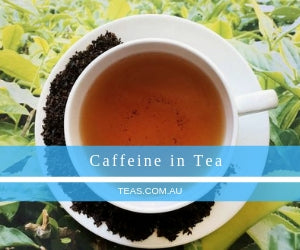Caffeine in Tea
Posted by SALINA - TEAS.COM.AU

Caffeine is one of the most asked questions about tea.
Want your tea to taste smoother?
A quick tip for you:
1. To get rid of some of the caffeine from the 1st infusion so the way to do it is to simply pour your hot water in on the tea leaves pour it out and just ditch that right away.
2. Brew it again as normal, from the second brew onwards enjoy that and you will find your tea to taste much smoother with less caffeine in it.
What is caffeine?
Caffeine is a water-soluble chemical that stimulates the heart and the brain. In its pure form, caffeine is a white powder which tastes extremely bitter. Caffeine is one of the natural components that makes tea TEA: it wakes you up; induces mental clarity.
How much caffeine is in tea?
This varies depending on the type of tea. While dry tea leaves contain a substantial amount of caffeine (but still less than coffee), it is rare that tea is consumed with leaves and all. As with the liquid yielded from brewing, generally speaking, a cup of tea contains about half to 1/8 of the caffeine content in coffee. Black tea contains the highest caffeine content, followed by oolong, green and white.

Will brewing make a difference in caffeine levels?
Yes – caffeine is water soluble, so how long you brew your tea and how hot the water is, will affect the caffeine content of your cuppa. So if you brew green tea in water just off the boil for 5 minutes (like when you brew black tea), there will be more caffeine in your cup than if you brew green tea the way it’s meant to be brewed – hot water (not boiling) and for 2 minutes.
Does coffee has more caffeine? Can I add more caffeine to my tea so it keeps me up like coffee does?
How do they decaffeinate tea?
Decaffeination is typically achieved by passing a chemical through wet tea leaves. This chemical acts as a bonding agent to the caffeine and when this chemical is removed so is the caffeine that has bonded to it.
There are 3 types of decaffeination chemicals used in the tea industry: Ethyl Acetate, Methylene Chloride or Carbon Dioxide. Tea decaffeinated using the first or last method is often known as “naturally decaffeinated” as both chemicals can be found in nature.
What’s ‘the flip side’ of decaffeination?
You may be surprised to know, decaffeination doesn’t actually take out all the caffeine.
Tea typically labelled “decaffeinated” contains about 4mg caffeine per 170ml cup (again exact amounts vary depending on tea type and brewing method). The decaffeination process is expensive (hence often only done on consumer grade tea such as standard bulk black tea), strips some of the flavours (hence decaffeinated tea often tastes muted) and loses some of its nutrients.
Out of the 3 decaffeination methods, Carbon Dioxide is the most expensive but keeps the most of tea’s original flavour and nutrients, hence most often used for tea decaffeination.

Created by PolicyExpert, the infographic ‘The Health Benefits of Coffee VS Tea’ points out the good and bad of both coffee and tea.
What’s our take on caffeine?
- While others may be happy selling decaffeinated tea, we feel caffeine is a natural part of tea. If caffeine is a concern, choose a lower caffeine content tea such as green or white tea.
- Want to totally stay away from caffeine? Try herbal or fruit infusions? Many of our readers find Chinese Red Jujube, Jujube helps to relieve joint complaints and relax tense body soothe the mind to have a good night's sleep.
- Many have also learned the trick of “natural decaffeination” – ditch the first quick infusion (for 10 seconds) of your favourite tea to remove most of the caffeine. Pour in fresh water and brew according to taste, or the brewing suggestion.
- Since caffeine affects us all differently, if you are concerned about caffeine, avoid drinking tea in the evening. Try herbal tea such as peppermint to help digestion or Calm Beauty to relax and get your body ready for a good night’s rest.
- Although most herbs do not contain caffeine, do take note: some herbs DO contain caffeine – eg yerba mate, cocoa and guarana.
TAGS:
SHARE:

AUSTRALIA'S FINEST LOOSE LEAF TEAS
Explore Australia's largest selection of Premium Teas & All-Natural Organic Herbal Blends.


